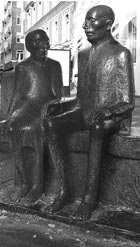Epilepsy in the elderly
 The epilepsy incidence in western countries is around 1% of the population with around 0.8% of new cases every year (in relation to the population) with more than 1/3 affecting the population of above 60 years of age. The epilepsy incidence in western countries is around 1% of the population with around 0.8% of new cases every year (in relation to the population) with more than 1/3 affecting the population of above 60 years of age.
More than two thirds of the attacks that occur in older people, are partial seizures with or without secondary generalization. The partial seizures are characterized by the fact that they are often followed by a phase of re-orientation when the affected person regains the orientation. During this period the person may seem confused and perplexed. After a partial seizure the patient is normally quite tired and demotivated.
Epileptic seizures in the elderly are often perceived as a real loss of control. The attack comes out of thin air depriving the victim control with victims often doing senseless things such as unmotivated undressing or similar leaving the victim terribly embarrassed after the attack.
The sense of loss of control - whether they relate to small partial seizures or attacks of the more dramatic generalized nature - may affect the person's relation to the surroundings. He or she typically may not wish to be a burden for friends and family and not destroy social gatherings and often feel insecure and inferior not wanting others to see him/her in humiliating situations. Therefore, it is very common for elderly people with epilepsy to isolate themselves. They simply stop socializing as they never know when the next attack occurs.
Isolation, fear and uncertainty may in the worst cases lead to depression, which perhaps could have been avoided if someone had talked to the person and the relatives about the situation. It may be necessary for the surroundings, be it family or health care professionals, to address the problem, as persons with epilepsy are often reluctant to disclose or discuss their illness.
What is the cause of epilepsy in the elderly?
When epilepsy strikes late in life, it will often be caused by another condition, such as a blood clot in the brain, stroke, disease of the brain's blood vessels, dementia and similar diseases.
The main causes are:
- Cardiovascular problems such as blood clots, haemorrhage: 44%
- Dementia: 9-17%
- Brain tumor: 8-45%
- Head injuries: 2-21%
- Alcohol/medicine: 10%
Source: Research Center for Epilepsy, Denmark.
Treatment of epilepsy in the elderly?
For the vast majority of people epilepsy is effectively treated with medication and particularly people who have epilepsy in old age stand a very good chance to avoid future attacks with the right medication.
In older people, it will often be the case that the epilepsy is not the only treatment problem. This poses some very specific demands for knowledge, both for those who prescribe the medication and for those who are around the person or care for the person.
Medical treatment of epilepsy is preventive and regular medication according to the prescription is essential to avoid future attacks.
Source: www.epilepsi.dk
Read this article in Danish
Przeczytaj ten artykuł w języku polskim
|